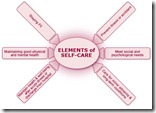South Asian culture is a collectivistic culture, meaning that individual needs and wants are pushed aside for the benefit of the whole group. Generally, people who are raised in a collectivistic culture are taught that it is best to sacrifice oneself if that means the group as a whole will be happier. Overall, it is emphasized that others are often more important than yourself.
This is exhibited in day to day life where hosts will take less food so that their guests will have enough, a friend my not suggest a different time for lunch to avoid inconveniencing her friend or a husband who bites his tongue about a legitimate complaint so as to avoid an argument. South Asian children who internalize these values learn to be more flexible as adults. They also are often better at compromising with others when there is a source of conflict than those who grow up with more individualistic cultures.
The downside is that when such an importance is placed on the “other” the “self” becomes lost and forgotten. The effect of this is a South Asian adult who becomes exhausted or burned out at constantly giving to others by making accommodations. The more burned out they become, the less efficiently they are able to take care of others around them. In addition, the higher the risk becomes of feeling resentful that you are always giving to others, which can be damaging to your physical health as well as your relationships.
Many South Asians believe that self-care goes against this strongly held value of others being more  important than the self. However, just as a car cannot keep running if it does not receive regular maintenance a human brain can become exhausted and be less functional as well.
important than the self. However, just as a car cannot keep running if it does not receive regular maintenance a human brain can become exhausted and be less functional as well.
The best way to take care of someone else is to take care of yourself first. This is the same reason that airlines instruct passengers to put on their own oxygen mask before helping others. If you are not capable to be fully functional, you will be doing yourself and others around you a disservice.
Whether you are a parent, a spouse, a daughter, manager, or brother be sure to take some time for yourself and rejuvenate. Do activities that make you happy, spend time every day de-stressing and always find at least 5 minutes each day where you do something for you and no one else.
Self-care can be absolutely anything. Examples include joining a gym, cooking your favorite food, painting your nails, watching your favorite show, cleaning the house, going to church or the temple, going for a walk, watching a comedy show, or getting a massage. It can be anything that helps you feel rejuvenated and is entirely for you. It does not have to take a significant part of your day and does not need to be complex. The goal is for you to do pay as much attention to what you need as you normally pay attention to others’ needs.
If you think of your emotional health as a bank, self-care is making long lasting deposits so that you can make withdrawals every time you care for your loved ones, help an employee or aid a stranger. You will be amazed at how much better you are at caring for the people in your life by doing these little things every day rather than running on an empty tank because you feel guilty for doing something for yourself.
What self-care activities do you like to do? When was the last time you engaged in one?
